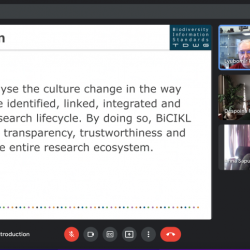Novel nanopublication workflows and templates for associations between organisms, taxa and their environment are the latest outcome of the collaboration between Knowledge Pixels and Pensoft.
This Nanopublications for biodiversity workflow was created with partial support of the European Union’s Horizon 2020 BiCIKL project.
First off, why nanopublications?
Nanopublications complement human-created narratives of scientific knowledge with elementary, machine-actionable, simple and straightforward scientific statements that prompt sharing, finding, accessibility, citability and interoperability.
By making it easier to trace individual findings back to their origin and/or follow-up updates, nanopublications also help to better understand the provenance of scientific data.
With the nanopublication format and workflow, authors make sure that key scientific statements – the ones underpinning their research work – are efficiently communicated in both human-readable and machine-actionable manner in line with FAIR principles. Thus, their contributions to science are better prepared for a reality driven by AI technology.
The machine-actionability of nanopublications is a standard due to each assertion comprising a subject, an object and a predicate (type of relation between the subject and the object), complemented by provenance, authorship and publication information. A unique feature here is that each of the elements is linked to an online resource, such as a controlled vocabulary, ontology or standards.
Now, what’s new?
As a result of the partnership between high-tech startup Knowledge Pixels and open-access scholarly publisher and technology provider Pensoft, authors in Biodiversity Data Journal (BDJ) can make use of three types of nanopublications:
- Nanopublications associated with a manuscript submitted to BDJ.
[...] Fancy to read the full article? Please click here and read it on Pensoft Website!
[The tool uses data and API services of ChecklistBank, Catalogue of Life, GBIF, GenBank/ENA, BOLD, Darwin Core, Environmental Ontology (ENVO), Relation Ontology (RO), NOMEN, ZooBank, Index Fungorum, MycoBank, IPNI, TreatmentBank, and other resources.]


